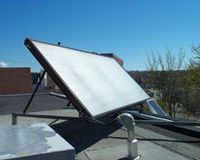Think of this as Volume 14, Number 38 of A-Clue.com, the online newsletter I've written since 1997. Enjoy.
 Each generation's economic model builds on the one that came before, and obsoletes one that came before that.
Each generation's economic model builds on the one that came before, and obsoletes one that came before that.
Moore's Law was built on manufacturing, and device energy will be built on Moore's Law. It's the idea of energy as resource, something that must be drug out of the ground, which grew here early in the 20th century, that will be replaced.
Moore's Law is usually described as the idea of silicon processing doubling every 18 months, as circuits get closer together.
But the economic forces that make it possible makes the process hard to start.
- Subsidies are needed to win the initial breakthroughs. In the case of Moore's Law, these subsidies came through the Cold War. Fairchild was a big military contractor. Military contractors bought every early advance, for missile systems and their peaceful-appearing analog, Apollo.
- Tech factories cost big money, and costs increase over time. Moore's Second Law holds that, as device complexity increases, so do the costs of initial production. You can make these up with time and quantities, but you still need increased amounts of capital with each generation.
- Consumer markets depend upon mass quantities. If we don't buy the '386, Intel doesn't have money to make the '486. The '486 is much better than the '386, but it won't emerge unless there's demand for what came before. This is how the private market for technology works.
- Standards and scale drive down costs. We learn as we build. The early runs of a new chip have many more errors than later runs. Per-chip costs go down as errors are corrected. But the later run is based on the same design as the early run. Maintaining standards throughout a product life cycle is imperative.
The reason I have called for a War Against Oil is because we need that kind of urgency in order to create the kinds of subsidies that will drive breakthroughs. Especially when it comes to solar systems these breakthroughs have several dimensions.
- Cost — How much does a panel cost? This determines what the pay-out in energy must be to make it worthwhile.
- Efficiency — How much of the Sun's incoming energy does the panel turn into electricity? As panels become more efficient, the time required to pay for themselves goes down.
- Useful Life — How long will the panel last, in actual use, before its performance degrades and it becomes useless? This is a key variable. If the panel breaks down before it has paid its way, the investment is a bad one.
 Early solar cells were produced just like chips, often by the same machines. This helped drive costs down. Breakthroughs were then needed on efficiency, but once they came we came up with problems regarding useful life. Installed solar panels degrade, they get dirty. Turns out it's not free energy.
Early solar cells were produced just like chips, often by the same machines. This helped drive costs down. Breakthroughs were then needed on efficiency, but once they came we came up with problems regarding useful life. Installed solar panels degrade, they get dirty. Turns out it's not free energy.
If you don't like the Cold War analogy for subsidy, how about the Apollo one? Energy harvesting systems have a lot in common with spacecraft — they must survive a long time in harsh conditions.
Current designs are getting very cheap, they're pretty efficient, but their big problem is useful life. Until we can give panels enough useful life to pay for themselves before they wear out, it's not going to work.
For this reason the last two years have mainly featured windmills, which depend strictly on manufacturing technologies (not high-tech) and which, with proper maintenance, last for decades. (It's also to wind's advantage that the efficiency of wind systems isn't jumping — you can buy with more confidence knowing next year's windmill won't be twice as good.)
Geothermal systems have their own problems. Because they're expensive to build, they need a stable source of heat. That means you need a deep well — hot zones like Hawaii, Iceland and Alaska are still considered too unstable for current designs. Current systems have a useful life of 20-30 years, so the numbers can be made to work. But they have to be big numbers.
Solar energy has the greatest transformative power because, once it meets criteria for cost efficiency (once the total cost of the cell, installation and maintenance, plus useful life, are enough to guarantee a return to its owner) its market can be self-generating, assuming we have standards that will allow quick and easy replacement. Plus, Moore's Law can kick in.
 The first IC to create a real market was the calculator, ironically about the same size as today's iPhone. Once the calculator and its DSP doppelganger, the Speak 'n Spell, proved the IC market existed, it became self-sustaining. Demand moved from the government (subsidy) market to the private sector. This was the process occurring at the time of the last poiltical crisis, in the early 1970s.
The first IC to create a real market was the calculator, ironically about the same size as today's iPhone. Once the calculator and its DSP doppelganger, the Speak 'n Spell, proved the IC market existed, it became self-sustaining. Demand moved from the government (subsidy) market to the private sector. This was the process occurring at the time of the last poiltical crisis, in the early 1970s.
This same process is happening today with regard to solar. But accelerating the move to self-sufficiency requires research subsidies and an assurance that whatever factories create will be bought. Thus, a high government priority is called for, and whichever governments give solar that priority will be rewarded.
Germany is providing this subsidy. China is providing this subsidy. If they succeed then basic intellectual property could become off-limits to American manufacturers.
Because no shots are being fired — because we're not at war with either Germany or China — there is a tendency to downplay the urgency. But wise governments (and bureaucrats hidden from view can be just as wise as anyone) understand the nature of what is going on and are setting priorities. The question is whether America, with its greater transparency (but greater intellectual power) will give this enough of a priority to give us a chance.
 The best news — the dog that does not bark — can be seen in the public profiles of major solar VCs, like Vinod Khosla, John Doerr (left) and (yes) Al Gore. Doerr addressed a recent solar summit in Las Vegas via e-mail. VCs seem quite happy with their deal flow, Khosla is keeping a low profile, and Gore has completely retired from politics — he doesn't seem to care anymore.
The best news — the dog that does not bark — can be seen in the public profiles of major solar VCs, like Vinod Khosla, John Doerr (left) and (yes) Al Gore. Doerr addressed a recent solar summit in Las Vegas via e-mail. VCs seem quite happy with their deal flow, Khosla is keeping a low profile, and Gore has completely retired from politics — he doesn't seem to care anymore.
What this tells me is that many projects are too small or too unproven, according to the VCs, to require political support. The solar industry is not currently pounding the table for subsidies. Research and capital flows are adequate.
I can only hope they're right. If they're only adequate because we're one global market, and their support is coming from India, China and Germany, then we're all in trouble.









Interesting blog. To summarize: (1) non-conventional energy is less inefficient (= costs more) than conventional energy; (2) if we don’t start taxing people more – so that we then can hand it out to alternative energy startups “we’re in real trouble”.
There. I just saved you 99% of your text.
Problem is of course you’re wrong. We’re not going to be “in big trouble” when we don’t increase our already high taxes and use the for subsidies. We’re already in trouble because of our culture of spending money that we haven’t earned yet, our culture of loaning money, and – more recently – our addition to spending money that we steal from our children and their children. Now that’s the big – and relevant – picture. Not some liberal dream about alternative energy. It’s simply not going to have an effect.
If you want to improve the economy, start by taxing less, and by reducing the debt. (and of course working for it all).
By the way Dana, why don’t you answer that question from a few days ago – you know, the one if you were already doing away with your car, or driving a hybrid? Oh – you still have your gas driven car? Hypocrite!
Interesting blog. To summarize: (1) non-conventional energy is less inefficient (= costs more) than conventional energy; (2) if we don’t start taxing people more – so that we then can hand it out to alternative energy startups “we’re in real trouble”.
There. I just saved you 99% of your text.
Problem is of course you’re wrong. We’re not going to be “in big trouble” when we don’t increase our already high taxes and use the for subsidies. We’re already in trouble because of our culture of spending money that we haven’t earned yet, our culture of loaning money, and – more recently – our addition to spending money that we steal from our children and their children. Now that’s the big – and relevant – picture. Not some liberal dream about alternative energy. It’s simply not going to have an effect.
If you want to improve the economy, start by taxing less, and by reducing the debt. (and of course working for it all).
By the way Dana, why don’t you answer that question from a few days ago – you know, the one if you were already doing away with your car, or driving a hybrid? Oh – you still have your gas driven car? Hypocrite!
Dana,
I’m going to make you happy – I decided to not visit your blog anymore. Apart from the fact that your site is increasingly slow to load (how many counters / scripts do you have in the background?), fact is I get a bit bored here. You revolve around three topics, and that’s it (1. hate/demonizing conservatives; 2. praising The One; 3. rambles about alternative energy). And half of the time presented as ‘thesis’ etc.
So my friend, I’m sorry I won’t be generating ad revenues for you anymore. My time is valuable.
You’re good writer, no matter what your political errors are.
Peace.
FrankyD
Dana,
I’m going to make you happy – I decided to not visit your blog anymore. Apart from the fact that your site is increasingly slow to load (how many counters / scripts do you have in the background?), fact is I get a bit bored here. You revolve around three topics, and that’s it (1. hate/demonizing conservatives; 2. praising The One; 3. rambles about alternative energy). And half of the time presented as ‘thesis’ etc.
So my friend, I’m sorry I won’t be generating ad revenues for you anymore. My time is valuable.
You’re good writer, no matter what your political errors are.
Peace.
FrankyD